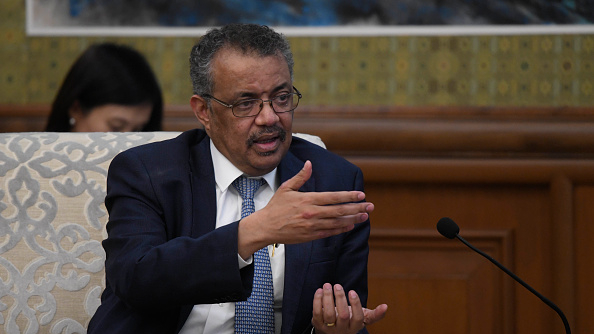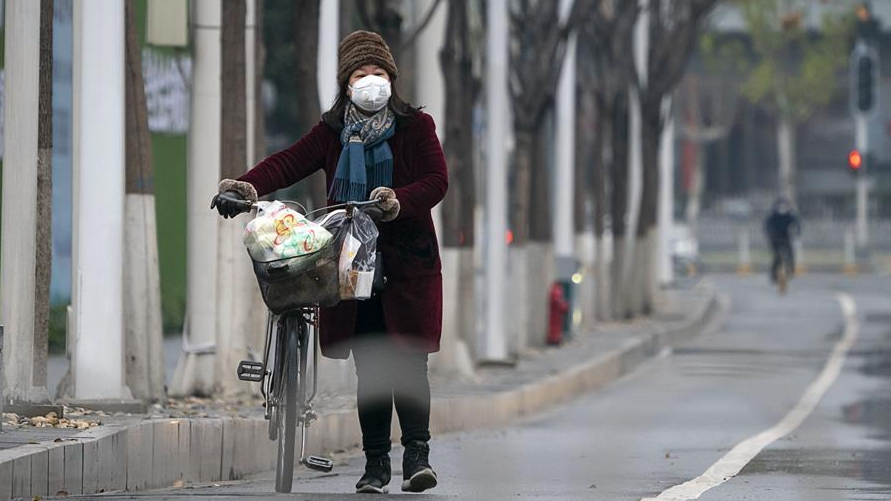
Director General of the World Health Organization Tedros Adhanom Ghebreyesus. Naohiko Hatta/Getty Images
Director General of the World Health Organization Tedros Adhanom Ghebreyesus. Naohiko Hatta/Getty Images
Editor's note: Andrew Korybko is a Moscow-based American political analyst. The article reflects the author's views, and not necessarily those of CGTN.
Dozens of misinformed people rioted in the central Ukrainian town of Novy Sanzhary on Thursday in response to fake news that they heard about the COVID-19 outbreak. Their government had recently evacuated 45 of its nationals, 27 foreign citizens, and 22 crew members and doctors from Hubei and planned to quarantine them for two weeks in the area, but a fake news email purportedly from the Ministry of Health, which, according to Buzzfeed and the BBC, either claimed that there were already several coronavirus infections in the country or that some of the evacuees were infected with the virus, respectively, provoked panic.
This happened despite Ukrainian security services saying that the email was not released by the Ministry of Health but originated from outside the country.
After the fake email started circulating, driven into a state of intense fear by the mainstream media's overreaction to this outbreak as it is, the locals of Novy Sanzhary became concerned that their lives might be in danger as a result of the government's decision to quarantine so many people near their homes. This led to them burning tires, blocking roads, and clashing with the hundreds of police who were urgently dispatched to disperse them.
The locals weren't convinced by the government's statement partly due to the severe distrust that they have in the state. In this specific case, however, they wouldn't have been as riled up had it not been for the highly irresponsible reporting of many mainstream media outlets about the COVID-19 outbreak. China has consistently warned that speculative reports at the expense of fact-based journalism could sow unnecessary panic among the population, but many companies were instead more focused on growing their audience by courting controversy than abiding by their duty to inform people of the objective truth of the matter.

A woman wearing a mask walks along a street in Wuhan, central China's Hubei Province, January 26, 2020. /Xinhua
A woman wearing a mask walks along a street in Wuhan, central China's Hubei Province, January 26, 2020. /Xinhua
These self-serving and utterly irresponsible tactics inadvertently served to precondition the Ukrainians of Novy Sanzhary into overreacting to the fake news that they were exposed to and fearing that their government was endangering their lives through its plan to quarantine nearly 100 people near their town. The rioting showed the world the dangerous consequences of fake news and media-driven fear, raising serious concerns that what happened in central Ukraine might repeat itself elsewhere if the lesson isn't urgently learned by all.
Media outlets need to behave more responsibly when reporting on the COVID-19 outbreak, and this should be done in coordination with national governments and civil society. All three of them must cooperate to ensure that the greatest number of people are informed of the facts. There is no reason why anyone would ever riot against the return of their countrymen from abroad if they were aware of how statistically unlikely it is that their compatriots were infected and the specific nature of their government's quarantine plans for them.
This could be accomplished through public service announcements on national TV and radio channels, front-page articles in leading newspapers and websites, and canvassing in city centers and other parts of town such as near transportation centers and inside schools to ensure that the greatest number of people are informed of the facts. If carried out properly, such coordinated activity could powerfully counteract the speculation and fake news that people are exposed to on social media, thus reducing the likelihood that they'll overreact to them.
It's incumbent on all responsible members of society everywhere in the world to ensure that their fellows don't follow in the footsteps of the dangerously misinformed residents of Novy Sanzhary. What happened in central Ukraine should be a lesson for everyone about the dangers resulting from the fake news and media-driven fear campaigns connected to the COVID-19 outbreak. With the proper will and effective coordination between all stakeholders, however, there's no reason why such regrettable events ever have to transpire again.
(If you want to contribute and have specific expertise, please contact us at opinions@cgtn.com.)